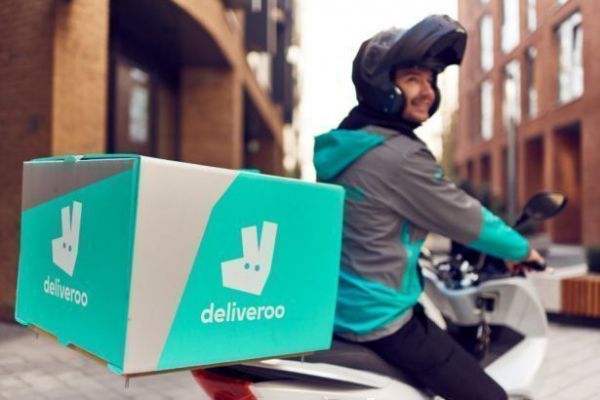Deliveroo's share price plunge on its London stock market debut has put a question mark over Britain's ambitions to become a home for fast-growing tech companies following its departure from the European Union, investors and analysts say.
Shares in the food delivery company slumped as much as 30% on Wednesday March 31 in one of the biggest first day falls for a stock in London. They were down another 2.2% on Thursday April 1.
Many of the reasons for the brutal decline are likely to be company-specific, according to a dozen interviews by Reuters of venture capital (VC) investors, bankers, analysts and tech executives.
But some said that it also highlights shortcomings in the London market and that - whatever the cause - it will deal a blow to Britain's efforts to attract more top tech companies.
"The volatility facing Deliveroo's share price is a setback for the UK's ambitions to convince more VC-backed tech businesses to list," EMEA Private Capital Analyst at PitchBook Nalin Patel said. "Deliveroo's decision to list on the LSE [London Stock Exchange] will come under scrutiny given its disappointing debut and the fact that Europe-based tech companies have predominantly listed in the US in recent years."
One source close to some Deliveroo board members said that some directors felt the loss-making company should have merged with a special purpose acquisition vehicle (SPAC) in New York - an increasingly popular way for firms to go public without an initial public offering (IPO).
"It's not great for London to be honest. The feeling is that Deliveroo should have SPACed to New York where investors understand and accept the risk associated with pre-revenue businesses," the source said.
A Deliveroo spokesperson declined to comment.
The LSE declined to comment on Deliveroo, but said that the exchange has had a strong start to the year for listings.
"The positive activity demonstrates the ability of UK capital markets to support dynamic companies across all sectors and from around the globe," head of capital markets at LSE Group Murray Roos said.
Attracting European technology companies has long been an goal for the LSE. Those ambitions became more pressing after Brexit, with London wanting to retain its position as a major global financial hub without access to EU markets.
The LSE, British government officials and bankers all launched a charm offensive to persuade Deliveroo to list in Britain.
Traditionally, European tech companies, such as music streaming firm Spotify, have chosen a New York listing to access the world's biggest tech investment community and an entrepreneur-friendly listing regime.
Britain's finance ministry declined to comment on the Deliveroo IPO but said the country had "a long track record of attracting the best companies in the world".
Several VCs and entrepreneurs said that Deliveroo's flop had more to do with company-specific factors than London.
Some questioned whether Deliveroo's recent growth could be sustained when coronavirus lockdowns are eased and worried its reliance on a gig-economy model might run into legal problems.
"There are specific issues for Deliveroo - workers rights, how much of the recent growth will unwind post-lockdown," partner at Balderton Capital Rob Moffat said. "I wouldn't get too into a read across for upcoming IPOs."
Some bankers also said that the deal had little relevance to the IPO pipeline.
"It's a sign that ESG [environmental, social and governance] concerns are very important to investors' minds," head of equity capital markets at BNP Paribas Andreas Bernstorff said. "If you combine that with the expensive valuation and governance, there was a unique cocktail of factors at play on this deal."
Still, some investor objections to Deliveroo could be read as a lower tolerance among British fund managers to entrepreneur-led growth firms with weaker corporate governance.
Heavyweight investors Aberdeen Standard Life, Aviva, Legal & General Investment Management and M&G all publicly stated their intention to stay away from the IPO. Unequal voting rights enjoyed by Deliveroo founder Will Shu were one of the reasons.
The Hut Group opted for a similarly unequal, dual-class share structure last year, and other IPO candidates are reportedly considering the same.
A listing review commissioned by UK finance minister Rishi Sunak has recommended such structures be allowed in London without restriction, but some investors are opposed.
As a result, some equity capital bankers believe British companies will once again look at the New York option.
"There is no shortage of SPACs to choose from," one said, referring to the record number of SPACs raising money in the United States and looking for acquisitions, many in Europe.
UK online car seller Cazoo Holdings Limited said this week that it is opting for a SPAC deal to list in New York.
Whether Deliveroo becomes a lesson on IPO execution or on venue, or just a natural unwinding of some of the froth around tech IPOs in recent years, remains unclear.
"It may be in part a reaction to the drumbeat of negativity around the first day IPO pop, which has led some issuers to demand overly aggressive IPO pricing," US-based partner at Bain Capital Ventures Matt Harris said. "While you could argue that the drop in price means that Deliveroo raised money at an admirably low cost of capital, I doubt they are rejoicing about it."
Small Investors Left With Bad Taste
London-based amateur trader Amy Lee wasn't sure whether to buy shares in Deliveroo's stock market debut but decided eventually to take the leap, swayed by ad campaigns on the food delivery company's app.
"I took a gamble," she said. "It was my own fault, but I think I was swayed by the thought 'surely Deliveroo wouldn't advertise a bad product to their customers through their app. That would be stupid right?'"
Lee and others like her who were allocated shares worth a total of £50 million are nursing paper losses after Deliveroo shares plunged as much as 30% on their London Stock Exchange debut on Wednesday March 31.
It may also raise questions about retail traders' appetite for future investments, especially in initial public offerings (IPO) - this was the first time individuals in Britain were given a chance to get in on the first-day action.
Deliveroo had dubbed its campaign, "Great food with a side of shares".
But things went wrong even before the IPO. Several asset managers shunned it, citing concerns about gig-economy working conditions and Deliveroo's corporate governance.
Many amateurs discussing the matter on online Reddit forums cited similar reasons for steering clear.
Since buying £250 worth of stock, Lee has done more research and now says she that is "gutted" to have given her money to "what seems to be another greedy tech company lacking social value or drive to do things differently".
But she can't sell until April 7, because of rules around "conditional trading" - a practice customary in London IPOs until the shares "settle", usually lasting a week.
A spokesperson for PrimaryBid, which is a platform that allows retail investors to participate in major share sales, said that this had been made clear to customers at every stage.
One Londoner who bought £295 of Deliveroo stock said that the company's sales team seemed to have "bent over backwards" to turn diners into investors.
"Every time you placed a Deliveroo order they flashed a sign. They let me invest even without a brokerage account. They said we will open up a Lloyds [bank] account for you and do it for you, [for] a one-off fee of £5. They made it super helpful," he said, requesting anonymity.
Asked for comment, a Deliveroo spokesperson said, "Although the trading started lower than we would have liked, we are just starting life as a public company and we are confident that our winning proposition will deliver long term value for all shareholders. We thank each of our customers who took part in our customer offer and will work tirelessly for them each and every day."
Deliveroo shares have recovered slightly from March 31's lows, but their first day performance was the worst on record for a London IPO worth more than £1 billion, markets platform Dealogic said.
Retail investors will likely be wooed by other market debutants as many trading companies, including the Robinhood app, say they want to "democratise" IPOs by not restricting allocations only to institutional investors.
PrimaryBid is in talks with other listings candidates, a source familiar with those discussions has told Reuters.
The company collects orders from individuals and then makes a collective bid on deals. Bankers say that it is becoming an influential participant, getting involved in fundraising deals from tech firm Ocado and caterer Compass Group.
PrimaryBid estimates retail ownership is approximately 15% of the UK stock market, as many people stuck at home in the pandemic with spare cash have taken to dabbling in equities on trading apps.
While UK amateur participation has risen from 10% in 2009, it lags US levels of 25%-30%.
Still, some - such as Sam Elliot, a London-based primatologist - confess to having become "obsessed" with stock markets, following the frenzy around US video game retailer GameStop in January.
He invested £250 in Deliveroo and, while also "gutted" by the shares' fall, intends to hold them for the long term.
Another investor - and former Deliveroo courier - Rui Lopes also committed £250, a sum that he said he could afford to lose.
He said, "The price drop did get me slightly apprehensive at first...but you know what they say. Buy the dip!"
And even without the first-day "pop" or surge last year's US deals enjoyed, investors could well end up in the money - after all, Facebook, Uber and Peloton were also IPO flops initially.
News by Reuters, edited by Hospitality Ireland. Click subscribe to sign up for the Hospitality Ireland print edition.









